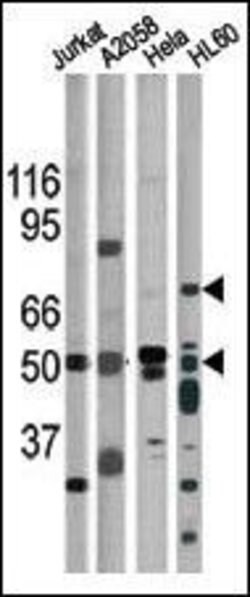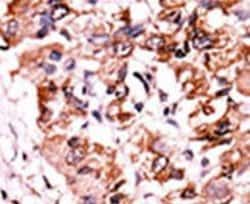Learn More
Phospho-CHK1 (Ser317), Polyclonal, Invitrogen™
Rabbit Polyclonal Antibody
Supplier: Thermo Scientific PA512575
Description
Checkpoint pathways control the order and timing of cell cycle transitions and ensure that critical events, such as DNA replication and chromosome segregation, are completed with high fidelity. The S. pombe Chk1 gene encodes a protein kinase that is required for the DNA damage checkpoint. Antibodies against CHK1 recognized a 54-kD protein on immunoblots of mammalian cell extracts. However,CHK1 is modified in response to DNA damage. In vitro, CHK1 directly phosphorylated a regulator of CDC2 tyrosine phosphorylation, CDC25C. In response to DNA damage, CHK1 phosphorylates and inhibits CDC25C, thus preventing activation of the CDC2-cyclin B complex and mitotic entry. CHK1 directly phosphorylates CDC25A during an unperturbed cell cycle, and that phosphorylation of CDC25A by CHK1 is required for cells to delay cell cycle progression in response to double-strand DNA breaks.

Specifications
| Phospho-CHK1 (Ser317) | |
| Polyclonal | |
| CHEK1 | |
| Serine/threonine-protein kinase Chk1, CHEK1, CHK1, | |
| Rabbit | |
| Antigen affinity chromatography | |
| RUO | |
| 1111 | |
| -20° C, Avoid Freeze/Thaw Cycles | |
| Liquid |
| Dot Blot, Immunohistochemistry, Western Blot | |
| Unconjugated | |
| O14757 | |
| CHEK1 | |
| KLH conjugated synthetic phosphopeptide corresponding to amino acid residues surrounding S317 of human CHK1 | |
| 400 μL | |
| Primary | |
| Human | |
| Antibody | |
| IgG |
Your input is important to us. Please complete this form to provide feedback related to the content on this product.

